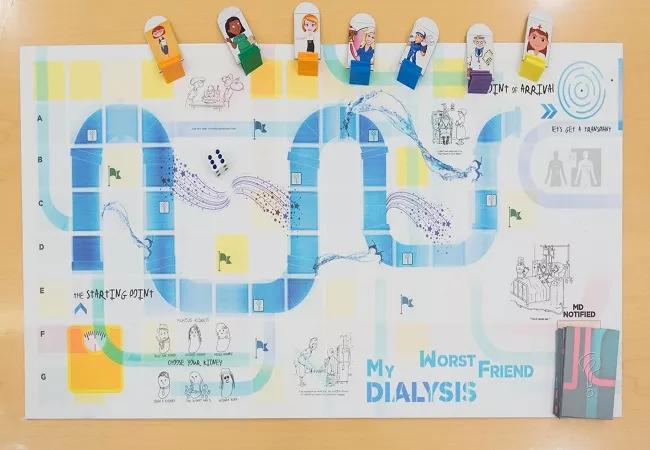Fellows learn by playing innovative board game

Nephrologists spend much of their time managing outpatient end-stage renal disease patients in chronic dialysis units. But their training may not have fully prepared them for this role.
Advertisement
Cleveland Clinic is a non-profit academic medical center. Advertising on our site helps support our mission. We do not endorse non-Cleveland Clinic products or services. Policy
“Nephrology fellowships traditionally focus heavily on acute, hospital-based care,” says Georges Nakhoul, MD, Director of Cleveland Clinic’s Center for Chronic Kidney Disease and Associate Director of the Nephrology Fellowship Program. “In the current model, trainees lack the educational experience of providing longitudinal care in the outpatient chronic dialysis setting, which is very different from caring for a hospitalized patient. Fellows need exposure to procedures and policies of a chronic dialysis unit, and to understand the important duties of the outpatient dialysis healthcare team.”
To ensure that all Cleveland Clinic nephrology fellows are proficient in outpatient dialysis, Dr. Nakhoul and Nephrology Fellowship Program Director Jonathan Taliercio, DO, thought of using supplemental educational tools, such as the question-and-answer games they, themselves, played as trainees.
Reminiscing about their own training is what inspired Drs. Nakhoul, Taliercio and their colleagues to develop a different type of game — one that would increase knowledge without the anxiety of not knowing the answers.
The result is a board game called “My Worst Friend Dialysis.” It’s intended to be an alternative to standard classroom didactics, emphasizing teamwork.
“Our intention was to shift trainees’ focus from wanting to win to wanting to learn, and I think we achieved that,” says Dr. Nakhoul. “The game was designed to be educational and fun, with the goal of not embarrassing the participant if they answered incorrectly. To win requires more than just answering the questions correctly but also a bit of luck, with random events that move players forward or backward. There’s no stress about having the right answers. As you play, you’re exposed to the subject matter you need to learn.”
Advertisement
The game earned Dr. Nakhoul and his co-developers — Dr. Taliercio, cardiologist Serge Harb, MD, and medical education specialists Wendy Green, PhD, and Cecile Foshee, PhD — a 2019 Scholarship in Teaching Award from the Case Western Reserve University School of Medicine.
Players participate as two-person teams: a first-year fellow paired with a second-year, to foster social learning and collaboration. Each team rolls dice to determine how many spaces to advance on a custom game board. Play begins on the “scale” space (just as dialysis patients start each appointment by stepping on a scale) and ends at the “transplant” space.
At each space in between, players answer a question about outpatient dialysis. If they answer correctly, they roll the dice and advance. If they answer incorrectly, they roll the dice and move backward.
In addition — similar to the classic children’s game Chutes and Ladders — whenever players land on a “dialysis water tube leak” space, they slide backward on the game board. Whenever they land on a “star trail” space (reminiscent of dialysis clinics’ star rating system), they jump ahead.
On some spaces, players draw a card. Cards add another level of random activity, such as skipping a turn or switching places with another player.
The original version of My Worst Friend Dialysis includes 50 questions encompassing six themes:
Questions cover the practical — such as naming the phosphorus binder shown on a card, or identifying the next step in processing dialysis water — to the organizational, like explaining the role of the medical director in a dialysis clinic.
Advertisement
The game can be played in one hour, which fits within a standard lecture schedule.
The reaction from fellows has been overwhelmingly positive. Survey results indicate that trainees prefer the game to other forms of classroom learning. Most notably, they rated their perceived learning as “superior to that of a standard lecture.”
Fellows shared that they were more focused on learning the information than guessing the answers, since correct answers weren’t directly linked to winning the game.
“The only downside was the noise,” says Dr. Nakhoul. “The players were loud because they were laughing so much. The game is as fun as it is educational.”
Fellows in Cleveland Clinic’s nephrology fellowship program will play My Worst Friend Dialysis multiple times during their training. Questions will be added on more nephrology topics, including those covered in board testing.
The game board is free to use. Download it at https://tinyurl.com/y4z3snlx.
Advertisement
Advertisement

Advanced software streamlines charting, supports deeper patient connections

How holding simulations in clinical settings can improve workflow and identify latent operational threats

Interactive Zen Quest experience helps promote relaxing behaviors

Cleveland Clinic and IBM leaders share insights, concerns, optimism about impacts

Cleveland Clinic partners with Palantir to create logistical command center

A Q&A with organizational development researcher Gina Thoebes

Cleveland Clinic transformation leader led development of benchmarking tool with NAHQ

Raed Dweik, MD, on change management and the importance of communication